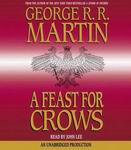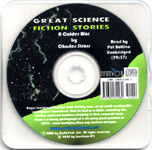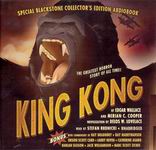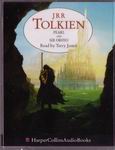
 A Feast for Crows
A Feast for Crows
By George R.R. Martin; Read by John Lee
26 CDs – Approx. 31 Hours [UNABRIDGED]
Publisher: Random House Audio
Published: 2005
ISBN: 0739308742
Themes: / Fantasy / Epic Fantasy / Medieval setting / Power Struggle / Dragons /
There’s a long story behind A Feast for Crows, but I’ll make it short. George R.R. Martin, while writing the fourth installment of the superior A Song of Ice and Fire epic fantasy series, found it was getting too long. Long enough, in fact, that if he published it as-was, it would need to be broken up into two volumes. So, rather than break the book into two pieces at the middle, he split the book by character, including the complete story of select characters in one volume, leaving the rest of the characters to appear in the next volume. A Feast for Crows, then, is the fourth book, and a new fifth book (A Dance with Dragons) will be published relatively soon. This novel is a bit shorter than the previous volumes, but still clocks in at 31 hours on unabridged audio.
Roy Dotrice read the first three volumes in the series, but this time British actor John Lee narrated. I’m not sure why the change was made; the narrators were very different. While Dotrice has a rough, earthy delivery, Lee’s style is smooth and skilled. Both narrators succeed with Martin’s story, because with such a large number of characters, ranging from royalty to peasants, each found places to shine.
The myriad of characters brings me to my next point. This is the first of these large novels that I’ve heard before I read. Some listeners have complained that the novels are difficult to follow on audio because there are so many entrances, but I didn’t feel that way until now. With this novel, I found that the portions of the book that involved characters I didn’t know from previous books were indeed difficult to follow. When a character I knew arrived on the scene, I was fully engaged with the story.
There is a very simple remedy to this. There are acres of real estate on the packaging for large audiobooks. Why not include a Cast of Characters (Dramatis Personae)? Why not include the maps from the print version? Both of these items would have been welcome.
I thoroughly enjoyed this book. I am a huge fan of Martin’s, and especially this series. I felt that this one started a bit slowly, but ended with a bang. I reveled in being in Westeros again. Many of the characters I like were not included in this novel, which both disappointed me and heightened my anticipation for the next volume. A Feast for Crows delivers much – I was riveted to the last third of this audiobook – but I can’t help to feel that it is incomplete, because of the missing characters and because it is the middle of a long wonderful saga that I am patiently waiting to see through.
Posted by Scott D. Danielson






